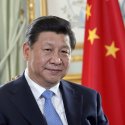XI Jinping

Président de la République populaire de Chine depuis le 14 mars 2013
Secrétaire général du Parti communiste chinois depuis le 15 novembre 2012
Président de la Commission militaire centrale depuis le 14 mars 2013.
Prédateur depuis 2013
Chine, 177e/180 au Classement mondial de la liberté de la presse 2021
MODE DE PRÉDATION : totalement décomplexé
Quand Xi Jinping, dont la famille a été victime de la Révolution culturelle, a accédé au pouvoir en Chine en 2013, on aurait pu s’attendre à ce qu’il mette en place des réformes libérales. Tout au contraire, il a renforcé la mainmise du régime sur l’information, restaurant en quelques années une culture médiatique digne de l'ère maoïste. En s'appuyant sur l'utilisation massive des nouvelles technologies, Xi Jinping a imposé un modèle social basé sur la censure, la propagande et la surveillance. L’administration chinoise du cyberespace (Cyberspace Administration of China, ou CAC), un organisme supervisé par Xi Jinping lui-même, empêche le milliard d'internautes chinois de recevoir et de communiquer librement des informations indépendantes. Les médias d'État ne doivent pas seulement obéir au Parti, mais également « refléter sa volonté, protéger son autorité et son unité ». L'application pour smartphone « Étudier Xi, rendre le pays plus fort », dont l’usage est obligatoire pour tous les journalistes depuis 2019, permet non seulement au régime de tester leur loyauté, mais est aussi soupçonnée d’accéder aux données contenues dans leurs téléphones. Sous Xi Jinping, le harcèlement des correspondants étrangers et de leurs sources a atteint de nouveaux records, tandis qu'à l'étranger, le régime tente par tous les moyens de promouvoir et d’exporter son modèle oppressif.
CIBLES DE PRÉDILECTION : tout ce qui n’est pas dans la ligne
DISCOURS OFFICIEL : endoctrinement paternaliste
« Les médias dirigés par le Parti et le gouvernement sont des outils de propagande qui doivent avoir le Parti comme nom de famille. » (Discours prononcé par Xi Jinping le 19 février 2016 lors d'une tournée d'inspection des médias d'État.)
« Les journalistes doivent aimer le Parti, protéger le Parti et suivre fidèlement le leadership du Parti en pensée, politiquement et par leurs actes. » (À propos des journalistes de CCTV, de l’agence Xinhua et du Quotidien du Peuple, février 2016.)


